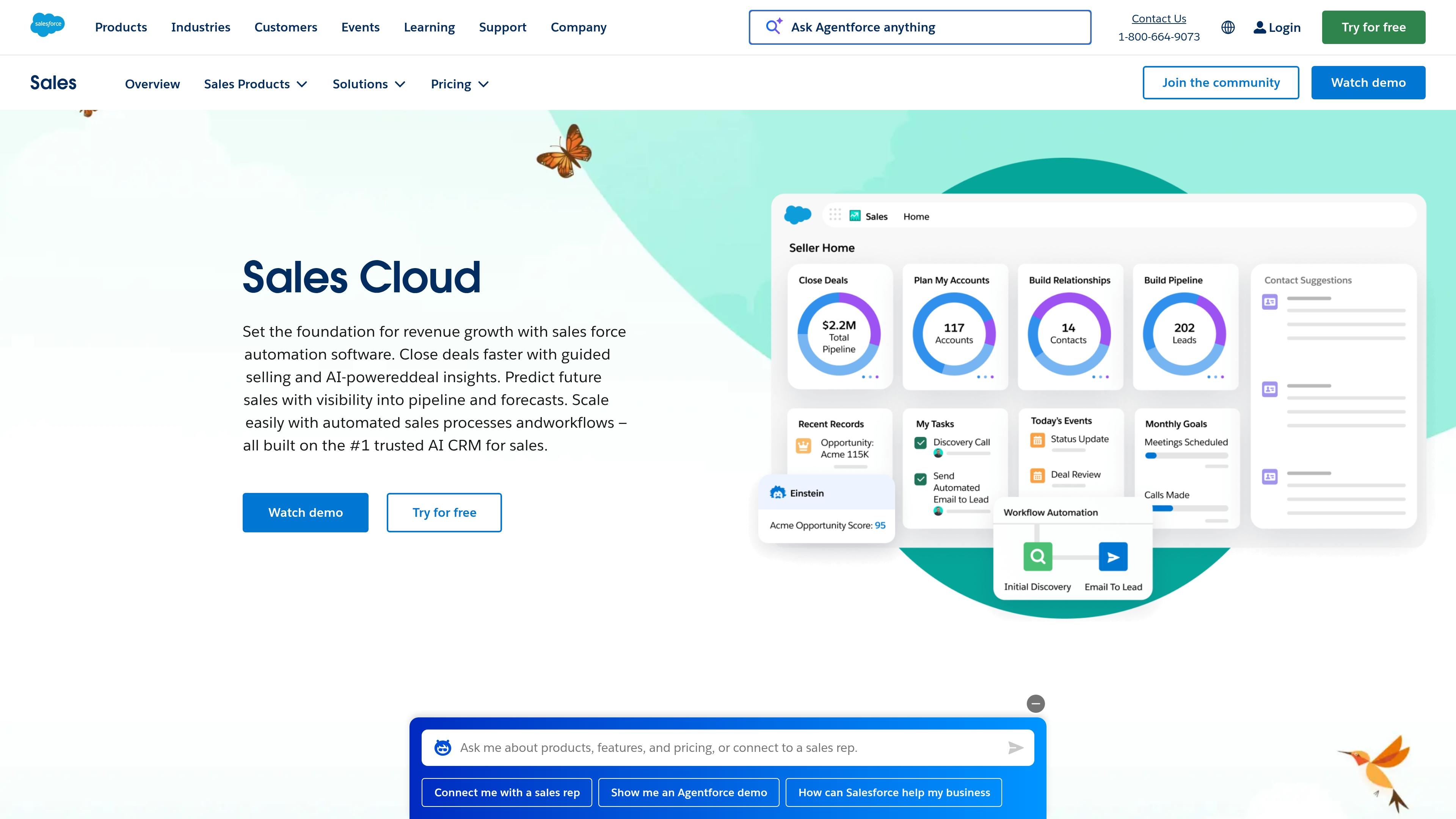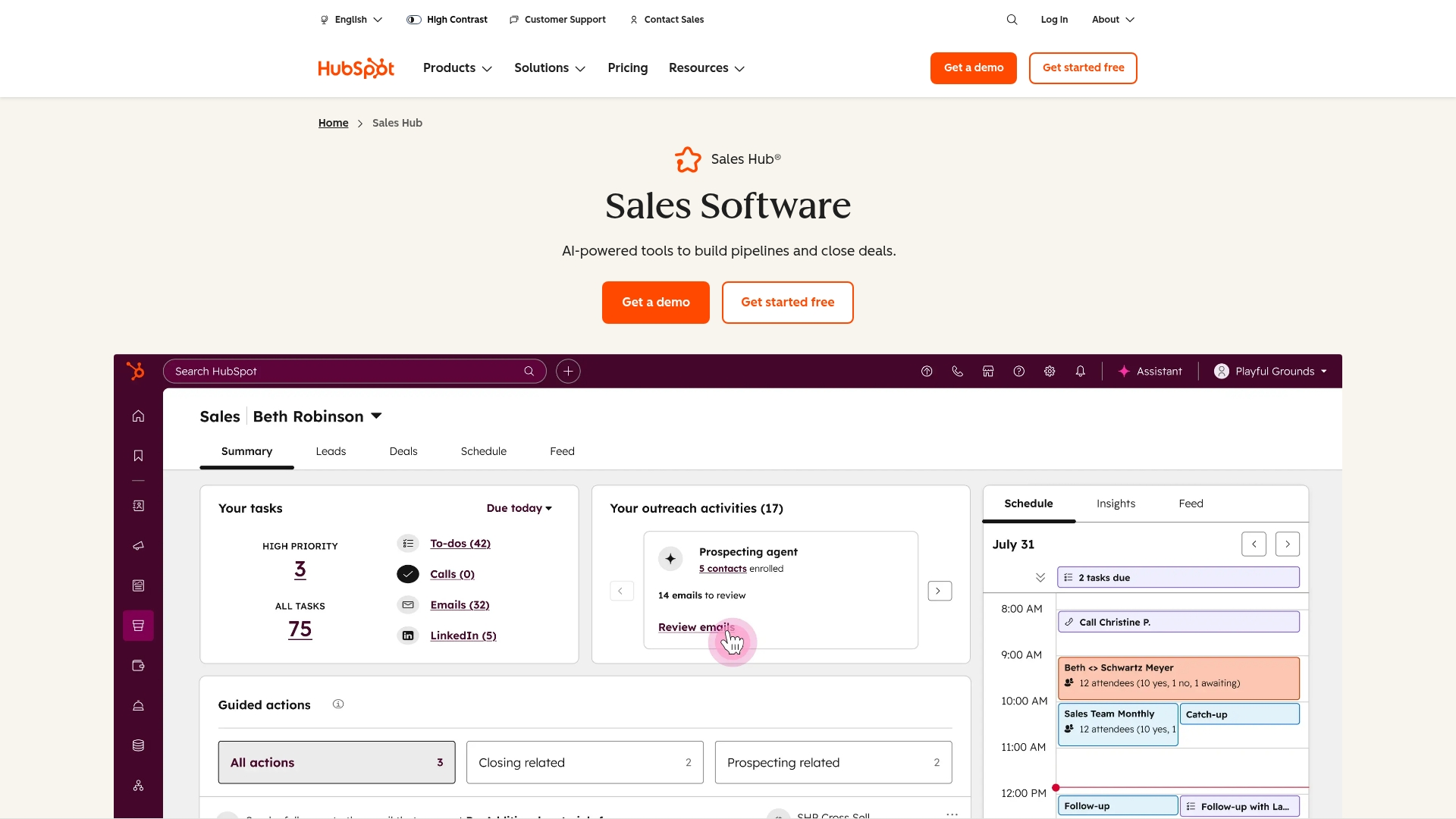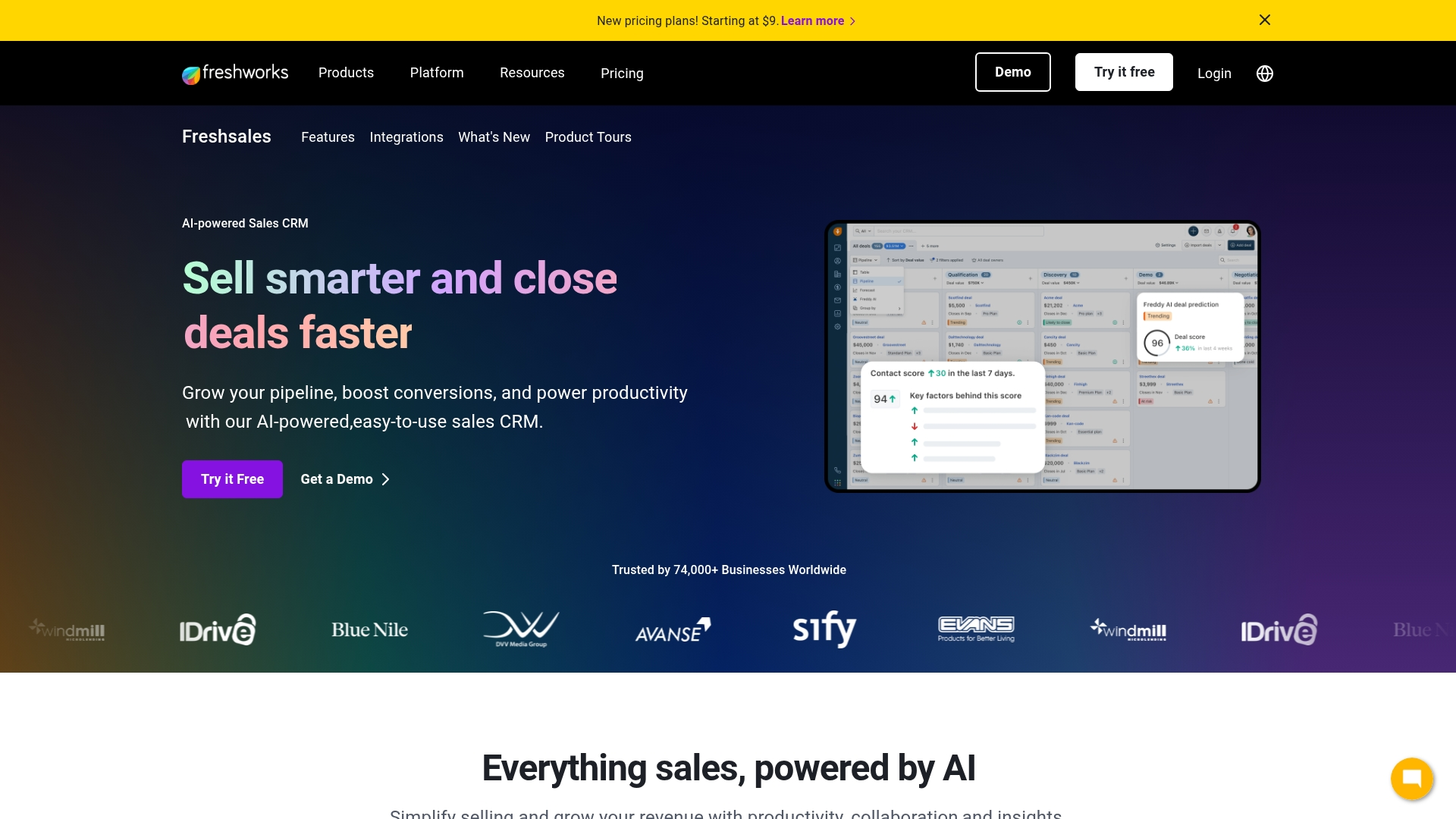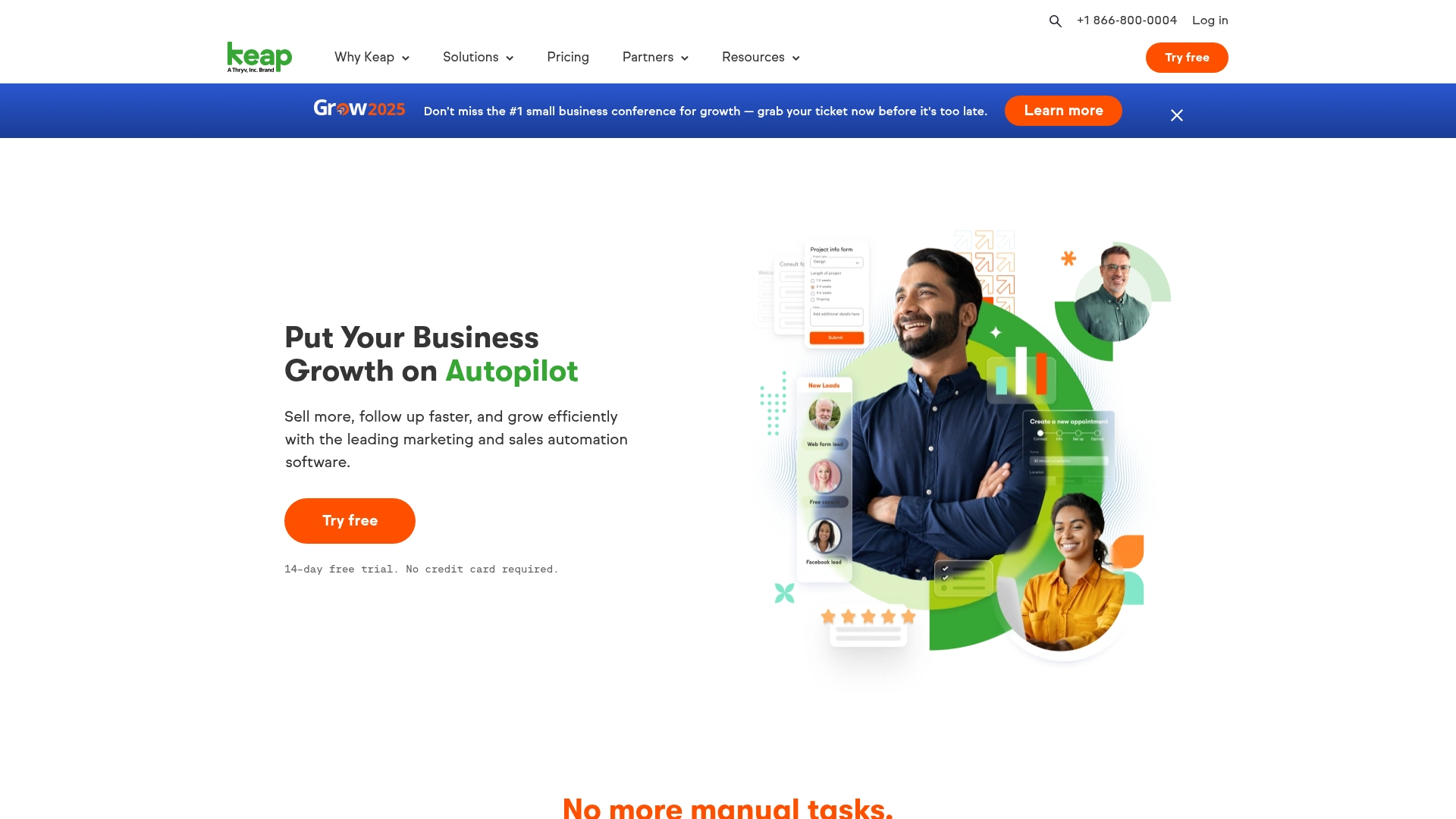Ever feel like your sales team is running blind? When deal information lives in scattered spreadsheets, buried email threads, and personal notes, your reps waste hours hunting for updates instead of closing business. Forecasts become guesswork. And your team spends more time managing chaos than building relationships with customers.
This is where sales pipeline software changes the game. The right platform transforms scattered data into a single source of truth, giving your team complete visibility into every opportunity and the confidence to move deals forward faster.
A flexible solution like monday CRM adapts to your unique sales motion, automating busywork and empowering your reps to focus on what they do best: winning deals. This guide covers the fundamentals of pipeline management, evaluates the top platforms on the market, and offers strategies for choosing and implementing the right solution to help your team win.
Try monday CRMWhat is sales pipeline software?
Imagine a shared game plan for your sales team, one that transforms a chaotic list of leads into a distinct, visual path to “closed-won.” Sales pipeline software provides this single source of truth, showing exactly where every deal stands and the next best move to make. It’s the ultimate upgrade from scattered spreadsheets and siloed inboxes.
This framework allows deals to flow through custom stages – from “New Lead” to “Negotiation” – giving your team the focus to act decisively. This process is supported by automated communications and reminders that maintain forward momentum. A powerful platform like monday CRM provides the visibility to see what’s working and the control to replicate that success again and again.
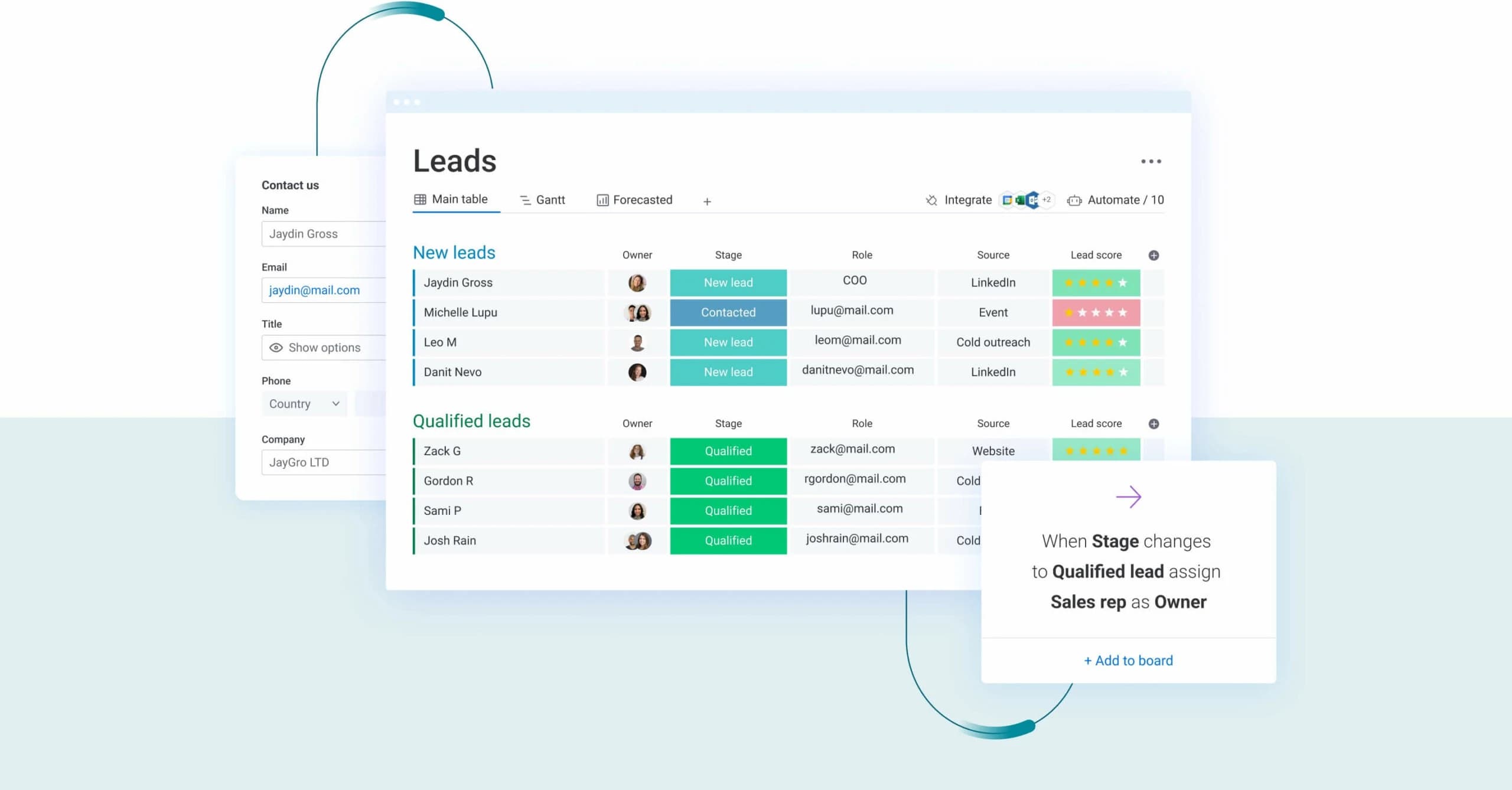
Its true advantage lies in its singular focus on the sales journey itself, unlike traditional CRMs that can be a jack-of-all-trades. By stripping away distractions and zeroing in on what reps need to close deals, this software gives your team back its most valuable resource: time. It’s about empowering sellers to do what they do best — build relationships and win more deals, faster.
Why your sales team needs pipeline management software
1. Eliminate data chaos and create a single source of truth
Your team’s weekly pipeline review might feel more like a scavenger hunt for updates than a genuine strategy session. When crucial deal information is scattered across spreadsheets and personal notes, opportunities get dropped and forecasting becomes a shot in the dark. A unified pipeline management platform resolves this chaos by bringing everyone onto the same page and establishing a single source of truth for every lead and deal.
2. Free your reps to focus on selling, not admin work
Your top performers didn’t sign up to spend their days updating spreadsheets and hunting down deal status. Pipeline management software empowers your reps to spend less time on administrative tasks and more time building the relationships that actually close business. With smart automations handling the busywork, your team can redirect their energy toward what they do best—winning deals.
3. Gain visibility and confidence to hit your numbers consistently
Real-time dashboards illuminate the path forward, giving your entire team incredible momentum. Forecasts become reliable, coaching becomes targeted, and everyone gains the visibility and confidence to hit their numbers, quarter after quarter. It’s all about creating a predictable, repeatable system that turns your sales process into a competitive advantage.
Try monday CTATop 10 sales pipeline management platforms
The right sales pipeline platform unlocks your team’s full potential by simplifying the path to closed deals, not adding complexity. We’ve evaluated the top contenders based on what modern sales teams need most: effortless automation, complete visibility, and frictionless scaling.
Whether you’re moving beyond spreadsheets or replacing an underused system, you’ll find a platform here that helps your team win more, together.
1. monday CRM
monday CRM transforms sales pipeline management into a visual, collaborative experience that motivates your team to track deals effectively. By combining the flexibility of a Work OS with powerful CRM capabilities, the platform is perfect for teams who want to customize their sales process without getting bogged down in complex configurations.
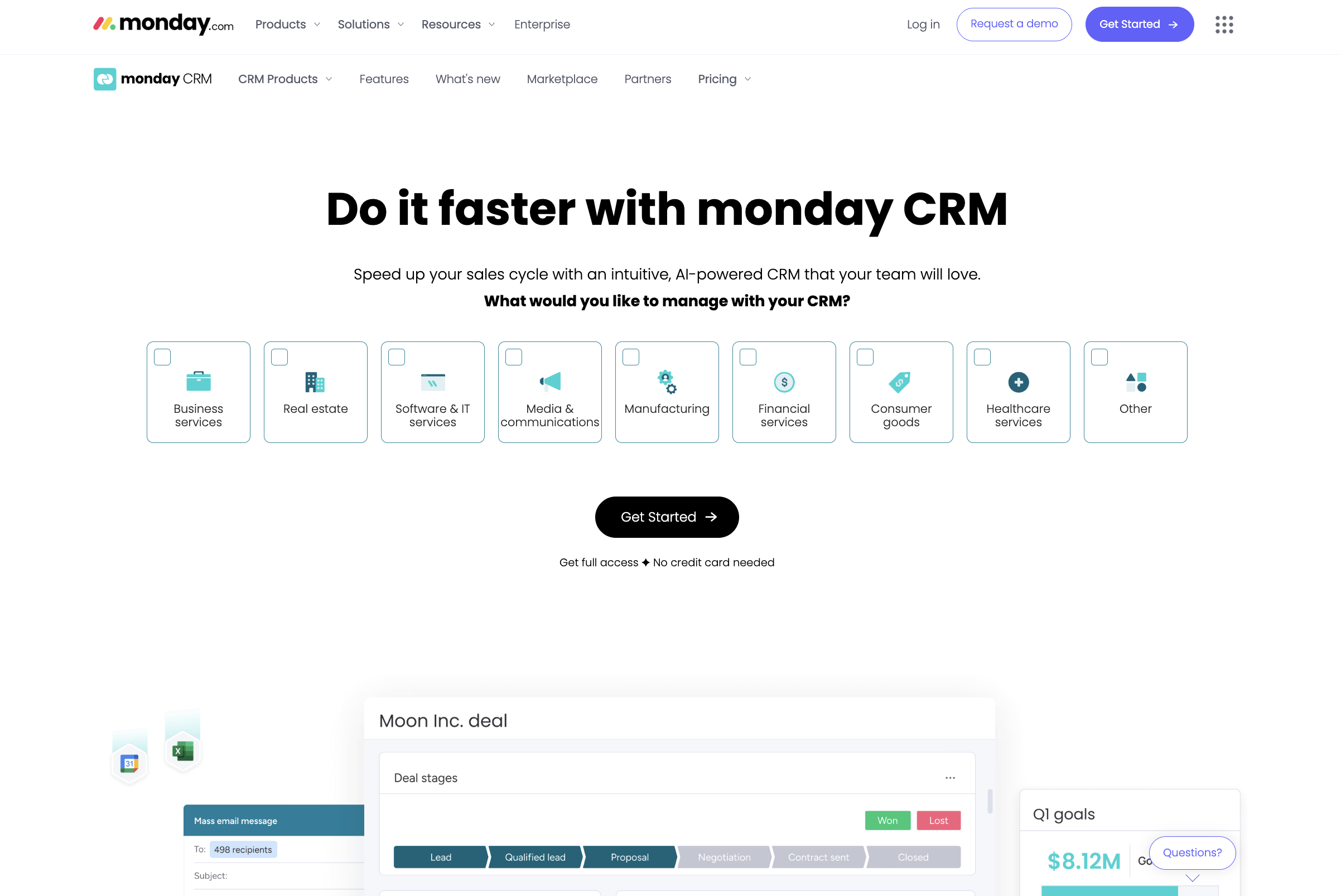
monday CRM empowers sales teams to build custom pipelines, automate repetitive tasks, and manage their entire sales cycle in one visual workspace that adapts to their unique processes.
Key features:
- Visual Kanban pipeline with drag-and-drop deal management and customizable stages
- No-code automations for lead routing, follow-up reminders, and deal progression
- Integrated email, activities tracking, and seamless connection to contacts and accounts
Pricing:
- Basic: $9/month per seat (billed annually)
- Standard: $12/month per seat (billed annually)
- Pro: $19/month per seat (billed annually)
- Enterprise: Custom pricing (contact sales)
Minimum of 3 users required for paid plans, with yearly plans saving 18% compared to monthly billing.
Why it stands out:
- Highly customizable Work OS foundation lets you build exactly the CRM your team needs
- Visual interface makes pipeline management intuitive and engaging for sales reps
- Seamless integration between sales activities and broader project management workflows
Advanced AI features
- AI-powered email composition helps craft personalized outreach messages that resonate with prospects
- Automated data enrichment through integrations like Crunchbase keeps contact information current and comprehensive
- Smart workflow suggestions optimize your sales process based on successful deal patterns
Automations
- No-code automation builder with 250+ pre-built recipes for common sales scenarios like lead assignment and follow-up scheduling
- Enterprise-scale automation capabilities handling up to 250K actions per month for complex sales operations
- Automated deal progression and notification systems keep your pipeline moving without manual intervention
Integrations
- Native connections to popular tools like Salesforce, HubSpot, Gmail, and Mailchimp for centralized workflow management
- Robust API access enables custom integrations with your existing tech stack
- Seamless data sync across platforms eliminates duplicate data entry and keeps information consistent
Sales pipeline software features
- Customizable deal stages and pipeline views provide complete visibility into your sales funnel from lead to close
- Real-time forecasting with probability tracking and automated revenue calculations help predict quarterly performance
- Collaborative deal management with shared email inbox and team communication tools ensures nothing falls through the cracks
2. Salesforce Sales Cloud
As an enterprise-grade CRM, Salesforce Sales Cloud is built for complex sales operations that demand extensive customization. The platform is a leader in AI-powered pipeline management and comprehensive analytics, making it a go-to for large organizations with sophisticated sales processes.
Use case:
Salesforce Sales Cloud helps enterprise sales teams manage complex, multi-stage pipelines with AI-driven insights and extensive customization capabilities.
Key features:
- AI-powered lead scoring and opportunity insights through Salesforce Einstein
- Customizable 7-stage pipeline framework with automated deal progression tracking
- Real-time analytics dashboards with forecasting and bottleneck identification
Pricing:
Salesforce offers several tiers, including Starter, Professional, Enterprise, and Unlimited. For the most current pricing information, we recommend checking their official website.
Considerations:
- Steep learning curve due to platform complexity and extensive feature set
- High implementation costs and may require dedicated admin support for optimal configuration
3. HubSpot Sales Hub
HubSpot Sales Hub excels by unifying sales and marketing activities within a single, powerful ecosystem. Its comprehensive approach to sales pipeline management, combined with seamless CRM integration and robust automation, makes it ideal for small to medium-sized businesses looking to streamline their entire customer journey.
Use case:
HubSpot Sales Hub helps sales teams visualize their entire sales cycle, automate repetitive tasks, and close more deals through integrated pipeline management and customer relationship tools.
Key features:
- Drag-and-drop pipeline visualization with customizable deal stages and automated deal creation
- Integrated quotes, email tracking, and meeting scheduling tools for streamlined sales processes
- Advanced analytics and forecasting with AI-powered insights for pipeline optimization
Pricing:
- Free: A free plan is available with basic CRM and pipeline features.
- Paid Tiers: Starter, Professional, and Enterprise plans unlock progressively advanced features. For the most up-to-date pricing, we recommend visiting the official HubSpot website.
Considerations:
- Limited pipeline customization options in lower-tier plans, with only two pipelines available in the Starter plan
- Advanced features like predictive lead scoring and custom objects are restricted to higher-priced Professional and Enterprise tiers
4. Pipedrive
Built around an activity-based selling philosophy, Pipedrive offers a visual approach to pipeline management designed for sales-focused teams. Its intuitive drag-and-drop interface makes it a strong choice for small to medium businesses that prioritize simplicity and clarity in their sales process.
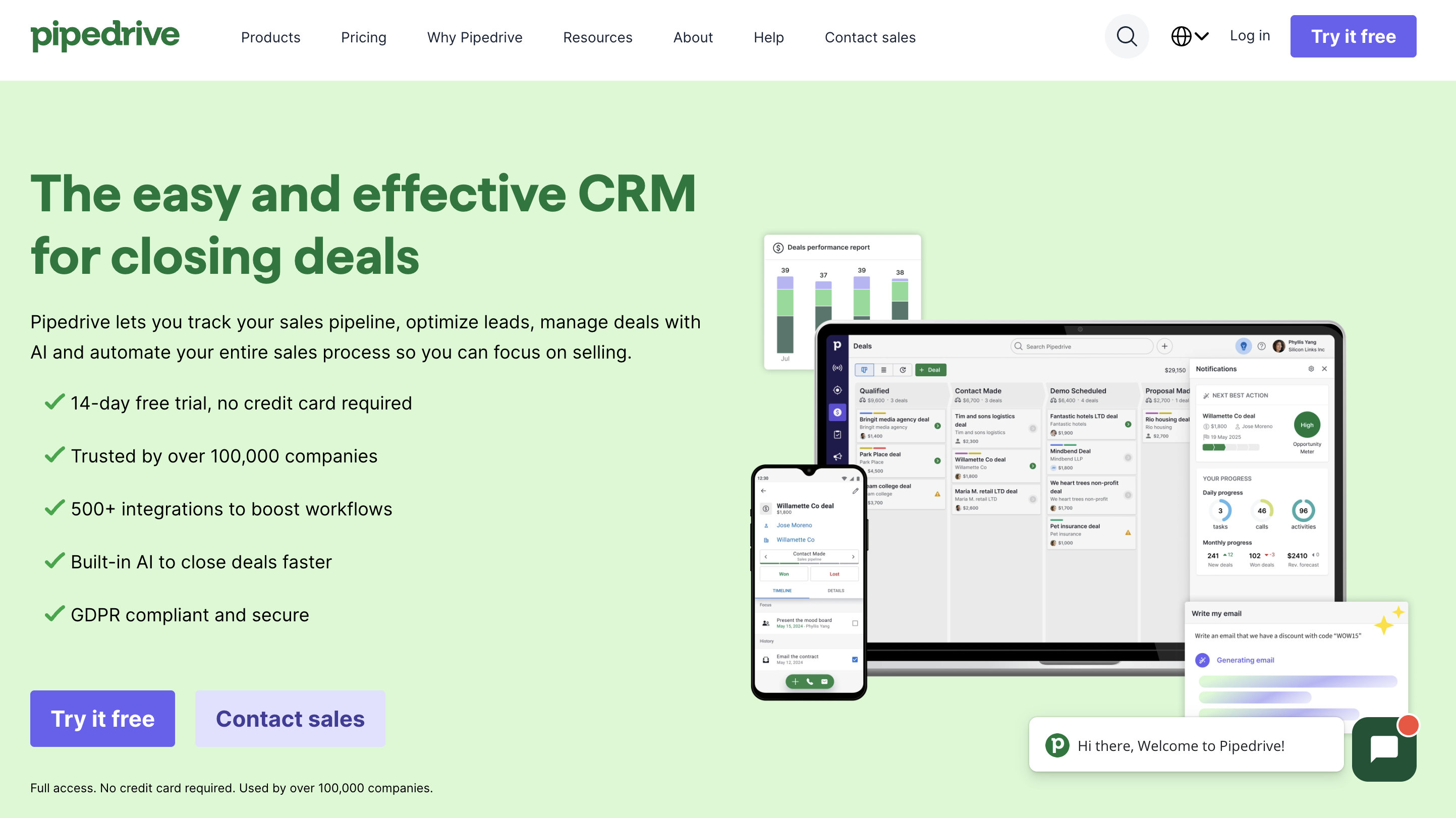
Pipedrive excels at helping sales teams visualize their entire sales process through customizable pipelines that encourage consistent, trackable activities leading to closed deals.
Key features:
- Visual Kanban-style pipeline with drag-and-drop deal management across customizable stages
- Activity-based selling methodology that focuses on scheduling concrete sales actions like calls, emails, and meetings
- Deal rotting alerts that highlight inactive opportunities to prevent leads from going cold
Pricing:
- Lite: $14/month (billed annually)
- Growth: $39/month (billed annually)
- Premium: $59/month (billed annually)
- Ultimate: $79/month (billed annually)
- Add-ons available starting at $6.67/month for additional features like Projects and Campaigns
- Free 14-day trial available for all plans
Considerations:
- Reporting and analytics features are basic in lower-tier plans, requiring upgrades for advanced forecasting capabilities
- Limited marketing automation and customer service functionality compared to all-in-one CRM platforms
5. Zoho CRM
As part of an expansive and integrated business suite, Zoho CRM provides comprehensive sales pipeline management that scales with your team. The platform is known for its deep customization and competitive pricing, making it ideal for small to medium-sized businesses that need enterprise-grade features without the enterprise price tag. With over 55 integrated applications and AI-powered insights, Zoho creates a unified ecosystem that eliminates data silos.
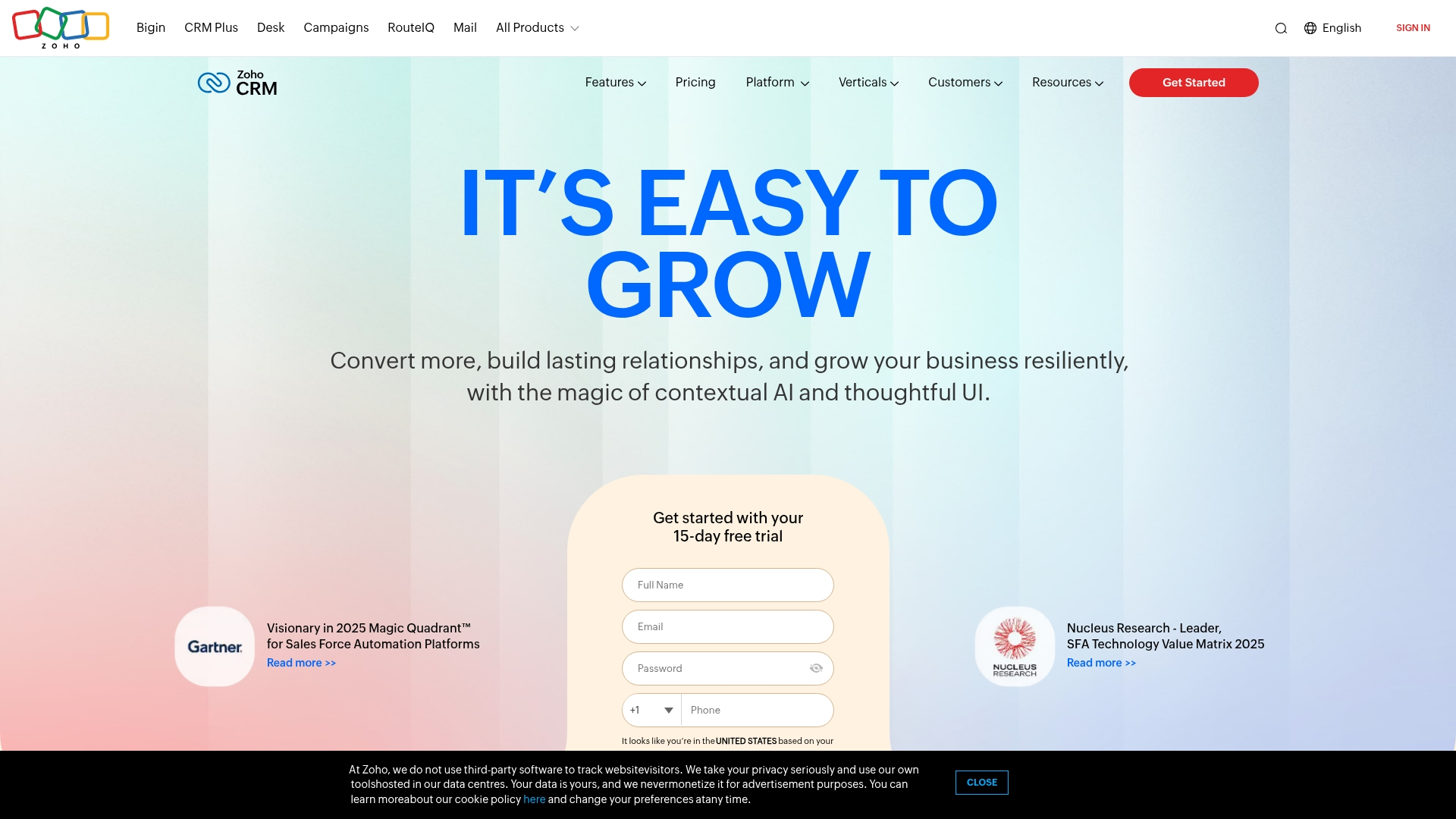
Zoho CRM excels at helping growing businesses standardize their sales processes while maintaining the flexibility to customize workflows for different product lines or customer segments.
Key features:
- Multiple pipeline management: Create distinct sales pipelines for different business processes, products, or customer types with customizable stages and probabilities.
- Blueprint process enforcement: Guide sales reps through required steps and actions at each stage to ensure compliance and prevent deals from falling through the cracks.
- AI-powered insights with Zia: Get predictive analytics on deal outcomes, conversion probabilities, and intelligent recommendations for next best actions.
Pricing:
Zoho CRM provides multiple pricing tiers designed to scale with your business needs, including a free edition. For the most current and detailed pricing information, please visit the official Zoho CRM website.
Considerations:
- Setting up complex automation and workflows can have a steep learning curve, particularly for teams without technical expertise.
- Advanced features like AI assistant Zia and sophisticated analytics are only available in higher-tier Enterprise and Ultimate plans.
6. Freshsales
Freshsales provides an all-in-one CRM solution where sales pipeline management, built-in communication tools, and AI-powered insights converge. The platform’s intuitive interface and affordable pricing make it an accessible entry point for small to mid-sized businesses new to CRM software.
Use case:
Freshsales excels at providing growing sales teams with visual pipeline management, AI-driven lead scoring, and integrated communication tools in one unified platform.
Key features:
- Multiple customizable sales pipelines with drag-and-drop deal management and weighted forecasting capabilities
- Freddy AI assistant for intelligent lead scoring, deal insights, and automated sales email enhancement
- Built-in phone, email, and chat functionality: that consolidates communication, removing the need for separate applications.
Pricing:
- Free: $0 for up to 3 users with basic pipeline management and communication features
- Growth: $9/user/month (billed annually) with advanced pipeline features and basic workflows
- Pro: $39/user/month (billed annually) including AI features, multiple pipelines, and advanced automation
- Enterprise: $59/user/month (billed annually) with field-level permissions, custom modules, and forecasting insights
- Add-ons: AI agent sessions at $100 per 1,000 sessions and CPQ functionality at $19/user/month
Considerations:
- Limited native third-party integrations compared to competitors like HubSpot, requiring Zapier or API connections for many tools
- Advanced reporting capabilities are less robust than dedicated business intelligence platforms, which may limit deeper sales analytics
7. Keap
Designed specifically for service-based small businesses, Keap functions as an all-in-one automation platform that merges CRM with marketing and sales pipeline management. It is particularly well-suited for consultants, coaches, and agencies that need to automate client communications while managing complex sales processes.
Use case:
Keap helps established small businesses with annual revenues exceeding $100,000 streamline their entire customer journey from lead capture to post-sale follow-up through powerful automation and visual pipeline management.
Key features:
- Drag-and-drop pipeline interface with customizable stages that automatically trigger email sequences, task assignments, and follow-up actions
- Multiple pipeline management for different products, services, or fulfillment processes with integrated CRM functionality
- Comprehensive analytics and reporting including deal conversions by stage, average deal duration, and revenue forecasting
Pricing:
- Pro plan: $299/month (billed annually at $2,988/year)
- Includes up to 50,000 contacts and 2 user licenses
- Additional users: $39/month per user
- Required implementation services sold separately
- Text marketing tiers available from $24-$279/month with varying message limits
Considerations:
- Higher price point compared to competitors may be prohibitive for very small businesses or solopreneurs
- Steep learning curve for users new to CRM and automation, despite mandatory onboarding support
9. Close
Close distinguishes itself as a sales-first CRM by integrating calling, SMS, and email capabilities directly into a single, high-velocity platform. The system is specifically designed for inside sales teams and high-volume environments where speed and seamless communication drive results.
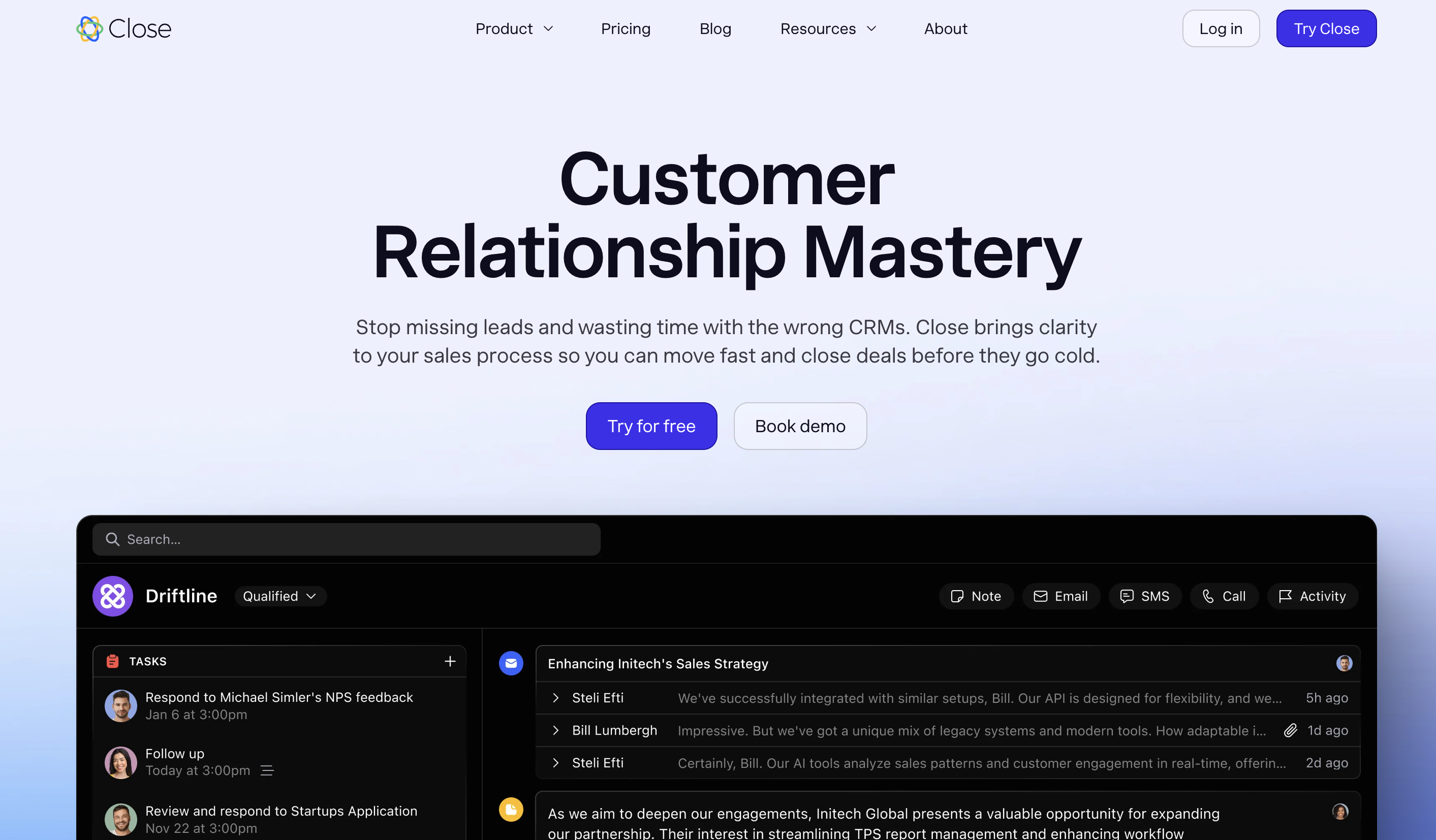
Close streamlines sales workflows by eliminating the need to switch between different communication tools, allowing sales reps to focus entirely on closing deals.
Key features:
- Built-in VoIP calling, SMS, and email functionality integrated directly into the CRM interface
- Visual Kanban-style pipeline with drag-and-drop deal management and customizable sales stages
- Automated workflows and smart reminders that ensure consistent follow-ups and prevent missed opportunities
Pricing:
Close offers several pricing tiers to fit different team sizes. For the most current details, it’s best to check their official website.
Considerations:
- Limited customization options compared to enterprise-level CRMs like Salesforce
- Fewer native integrations available, though Zapier connections help bridge the gap
10. ActiveCampaign
ActiveCampaign bridges the gap between marketing and sales with powerful pipeline automation driven by customer behavior. Its specialization in behavioral-triggered automation and AI-powered deal scoring makes it ideal for businesses that want their marketing efforts to directly fuel their sales pipeline. With over 180,000 businesses using the platform across 170+ countries, ActiveCampaign has proven its ability to scale with growing teams.
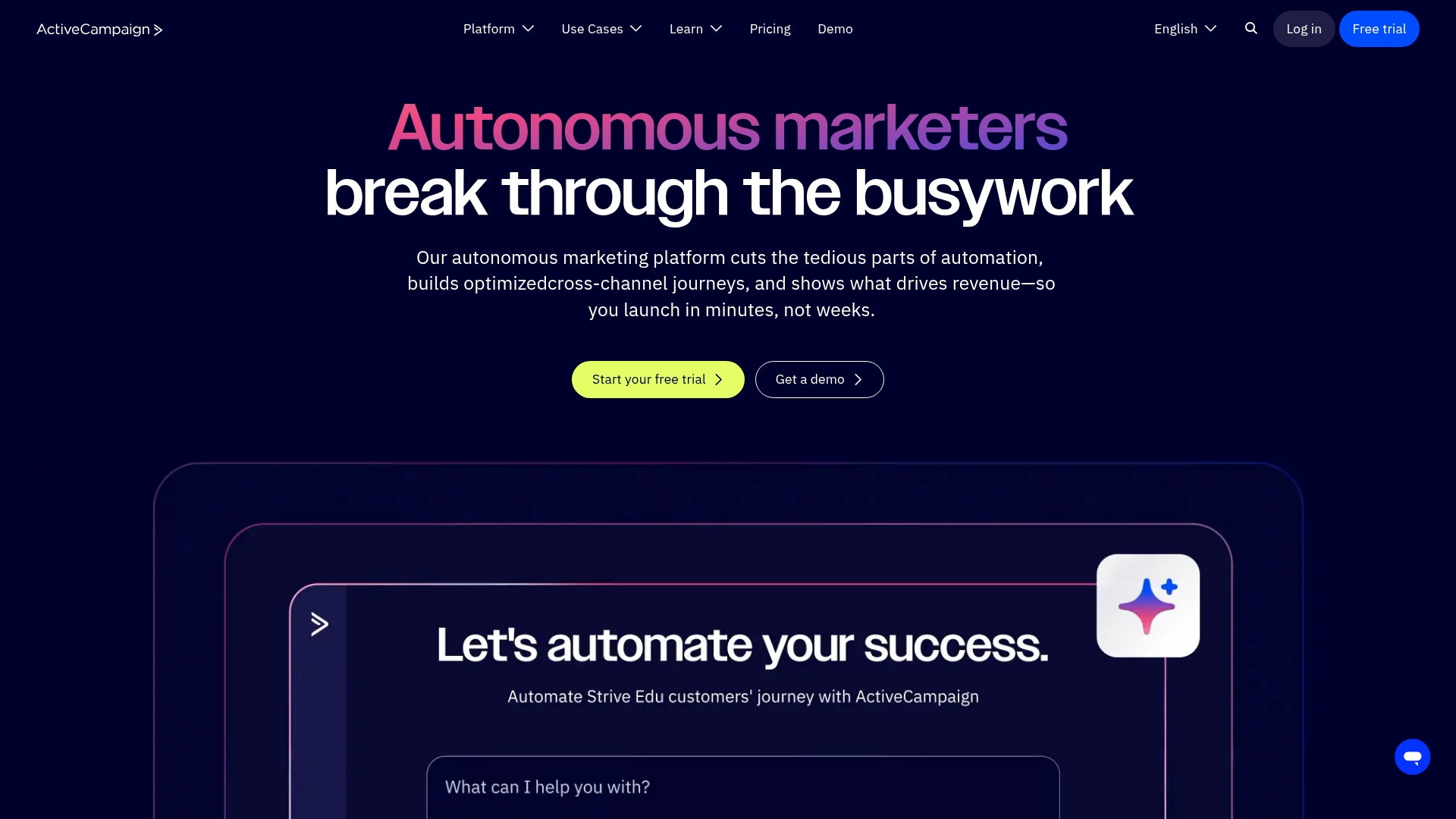
ActiveCampaign excels at automating the entire customer journey from first contact to closed deal, using behavioral triggers to move prospects through customized sales pipelines without manual intervention.
Key features:
- Visual pipeline builder with unlimited customizable stages that automatically move deals based on customer actions like email opens, website visits, or form submissions
- AI-powered deal scoring and win probability analysis that helps sales teams prioritize the most promising opportunities
- Seamless integration between email marketing campaigns and sales workflows, ensuring no lead falls through the cracks
Pricing:
- Starter: $15/month (billed annually, starting at 1,000 contacts)
- Plus: $49/month (includes full CRM and sales pipeline features)
- Pro: $79/month (advanced reporting and attribution)
- Enterprise: $145/month (custom reporting and dedicated support)
- 20% discount available for non-profits
- All plans include 14-day free trial with no credit card required
Considerations:
- Sales pipeline features are only available in Plus plan and above, which may be cost-prohibitive for very small businesses
- While the CRM is functional, it lacks some advanced sales-specific features found in dedicated sales platforms like Salesforce or Pipedrive
How AI enhances sales pipeline management
Your top performers might have a sixth sense for spotting winners, but that intuition doesn’t scale across your entire team. Meanwhile, promising opportunities get lost while reps waste hours manually updating records and chasing down next steps.
Sounds terribly familiar? AI can be your ultimate answer here.
It acts as an intelligent co-pilot for your sales team, transforming mountains of data into clear, actionable insights and automating the busywork that slows everyone down. Your team gets back what matters most: time to focus on building relationships and closing deals with greater confidence.
With monday CRM, AI scales your top performers’ instincts across your entire team, pinpointing your highest-potential opportunities and predicting deal outcomes with surprising accuracy. It’s like giving everyone a playbook based on what’s actually winning deals, right inside your CRM. AI helps you get ahead of the curve by spotting the early warning signs of a deal going sideways before it’s too late, automating critical communications and follow-ups so no lead gets lost, ever again.
Selecting the right pipeline management CRM
Choosing the right CRM is a strategic decision that should amplify your team’s talent, not force it into a rigid box. Let’s walk through the fundamentals of selecting a platform that will actually move the needle.
Assessing your sales process requirements
First, gain a clear picture of your sales playbook. What are the key stages—from the opening call to the final handshake—that your team executes to win? The best CRM molds to your established strategy, giving you the freedom to implement your process your way, without compromise.
Whether you’re a tight-knit squad or a growing league of reps, your platform needs to keep everyone in sync and moving toward the same goal. That’s why we built monday CRM with total flexibility, allowing you to customize everything from pipelines to permissions to perfectly match your team’s structure and accelerate your unique sales motion.
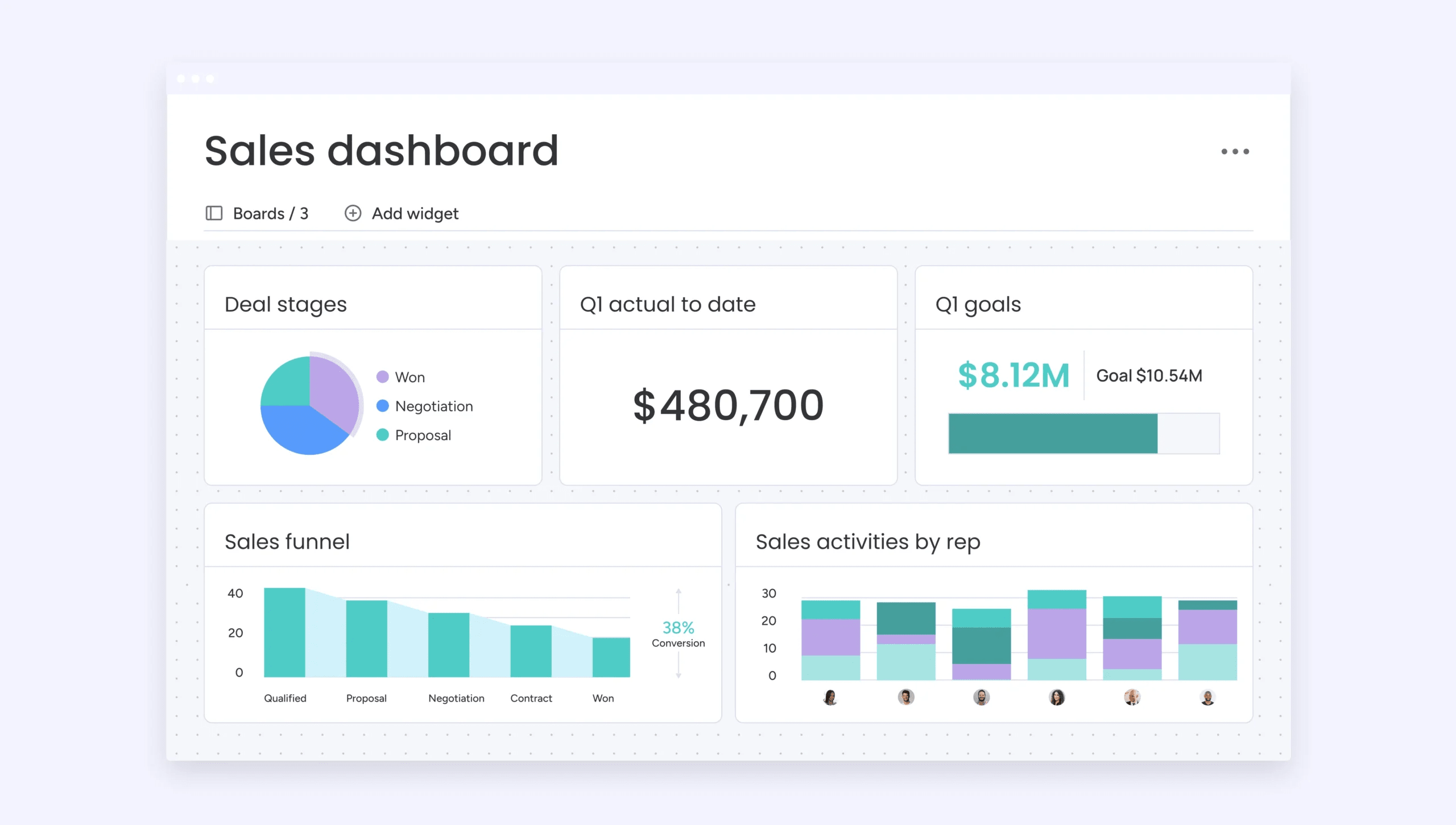
Comparing pricing models and ROI
View your CRM as an investment in your team’s performance, not just another line item on the budget. It’s important to look past the sticker price to see the whole picture, which includes hidden costs like lengthy training or low adoption from clunky tools that nobody wants to use.
The right platform delivers a tangible return by accelerating your team’s performance and improving decision-making. This translates into real results—like shrinking your sales cycle and boosting your win rate—that you can see in your bottom line, proving its value from day one.
Evaluating integration capabilities
Your sales team doesn’t operate in a silo, and neither should its CRM. To achieve a full view of the field, the platform must connect seamlessly with other essential tools in your playbook, such as email, marketing automation, and finance systems.
The winning strategy is to find a CRM that acts as your team’s central command center, combining powerful built-in features with easy integrations. This gives you the best of both worlds: a single source of truth that connects your entire tech stack, reducing friction and giving your team more time to focus on what they do best—selling.
Try monday CTAPipeline software implementation strategies
The success of a new pipeline tool depends on a strategic rollout. A thoughtful approach transforms a simple software setup into a powerful engine that fuels your team’s success, ensuring everyone hits the ground running with confidence from day one.
1. Align the platform with your actual sales process
This winning foundation is built by aligning the platform with how your team actually sells, not how a spreadsheet dictates they should. By mapping your unique process and ensuring data is clean from the start, monday CRM becomes your single source of truth for every deal. This instantly gives your team the visibility and control they need to move faster.
2. Prioritize clean data migration from day one
Getting the implementation right starts with establishing a solid data foundation. Clean, accurate information from the beginning eliminates confusion and ensures your team can trust the system. This means carefully mapping your existing data, removing duplicates, and standardizing formats before launch—creating a reliable source of truth that powers confident decision-making.
3. Focus on user adoption and ongoing optimization
Getting the implementation right is what unlocks true sales momentum. Your team can stop wrestling with clunky tools and focus entirely on what they do best: building relationships and closing deals. This is how we build a system that saves resources and helps everyone close with more confidence.
Why monday CRM is built for pipeline management
Effective pipeline management requires software that adapts to your team, not the other way around. monday CRM is designed as a flexible partner that molds to your team’s unique sales motion, rather than a rigid system that dictates it. You can build and adjust your ideal workflow in minutes without any code, empowering your team to stay focused on selling.
The platform helps you win back valuable time by automating the repetitive tasks that bog down your day, from follow-up reminders to updating deal stages. Practical AI works quietly in the background, surfacing the highest-potential leads and offering smart recommendations your reps will actually use. This isn’t about adding complexity; it’s about giving your team the confidence to move faster on the right deals.
True pipeline mastery comes from a complete view of the customer journey, and that’s where monday CRM unites your efforts. Everyone gets the visibility they need, creating a handoff process that leads to a more aligned and confident revenue team.
FAQs about sales pipeline software
How long does sales pipeline software implementation typically take?
The time it takes for sales pipeline software implementation can range from a few days to several weeks, depending on your team's size and the complexity of your data migration. Platforms designed for intuitive setup, like monday CRM, significantly shorten this timeline by empowering teams to get started quickly.
Can small businesses use pipeline software effectively?
Yes, small businesses often see the greatest return by replacing manual spreadsheets with automated tracking, communication logs, and forecasting. Scalable platforms grow with your business, making them a smart investment from day one.
What happens to existing data when switching pipeline software?
Modern platforms use robust import tools to migrate your existing contacts, deal history, and communications from spreadsheets or previous CRMs. This process includes data mapping to ensure all your information lands in the right place, maintaining business continuity.
How does pipeline software integrate with email and calendar systems?
Seamless integrations automatically log sent emails and scheduled meetings to the correct contact or deal record, eliminating manual data entry. This creates a centralized, up-to-date hub for all team communications without disrupting your workflow.
What security features should businesses look for in pipeline software?
Look for data encryption, granular user permissions, comprehensive audit logs, and compliance with standards like GDPR and SOC 2 Type II. These features are non-negotiable for protecting sensitive customer and revenue data.
Is training required for sales teams to use pipeline software?
While some initial training is beneficial, the learning curve is significantly reduced when you choose an intuitive, user-friendly platform. High adoption rates come from software that complements your team's natural workflow, not one that complicates it.


